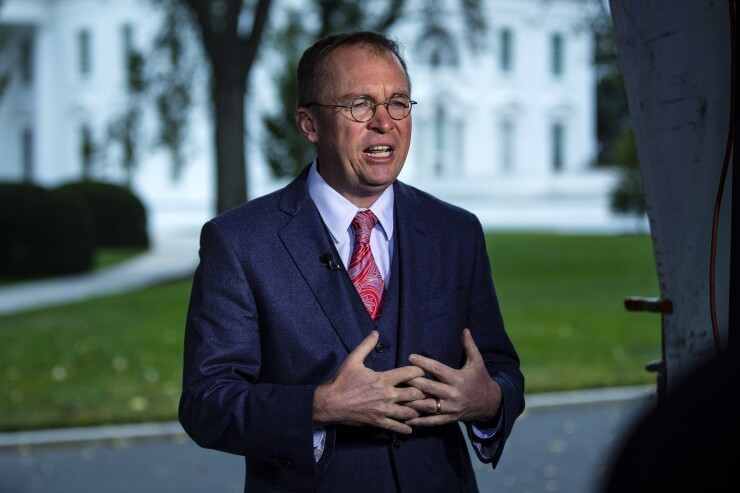In trying to define "abusive" practices, the Consumer Financial Protection Bureau is developing rules of a road that has already been paved.
The new standard, which was mandated through the Dodd-Frank Act, is more extreme than other types of consumer harm from earlier laws. Until now, the CFPB has fined companies under the abusive standard without defining it, building precedent through enforcement actions.
Now that acting CFPB Director Mick Mulvaney
"It will be necessary for any notice of proposed rulemaking to ask a lot of questions versus presenting a developed set of proposed rules," said Quyen Truong, a partner at the New York law firm Stroock & Stroock & Lavan. "I think this is something that’s going to take a while to come through."
The agency is expected to seek a narrower definition of what constitutes "abusive" than others believe Dodd-Frank allows. Mulvaney has said former CFPB Director Richard Cordray's decision to use the new standard without a prior rulemaking gave the agency too broad a mandate.
"This is Mulvaney putting his money where his mouth is in not regulating by enforcement," said Amy Hanna Keeney, an attorney at Adams and Reese in Atlanta. “A proposed rulemaking would expand guidance around abusive by reining in the scope of abusive.”

Under the Federal Trade Commission Act, regulators already had broad powers to punish firms for "unfair" or "deceptive" conduct. Dodd-Frank added the "abusive" standard. (The three categories are commonly referred to as UDAAP, or "Unfair, Deceptive or Abusive Acts and Practices.)
However, even though Mulvaney has denounced the agency’s past practices, he has continued to use the CFPB’s broad authority under Dodd-Frank to target firms for UDAAP violations.
Last month, after Mulvaney announced his intention to consider a rulemaking to define abusiveness, the CFPB filed a
“There are two ways that agencies make law — through rulemaking and through adjudication,” wrote Ori Lev, a partner at Mayer Brown, on his
Lev says Mulvaney has “helped muddy the waters” by pleading claims under a different prong of abusiveness than had been used under Cordray in similar circumstances.
“The only thing consistent about the Bureau’s approach is its inconsistency in determining what prong of abusiveness applies to similar sets of facts,” Lev wrote.
Under the law, the new "abusive" standard means activities that disrupt a consumer's ability to understand product terms, or that take advantage of a consumer's lack of understanding, inability to protect his or her own interests, or reliance on a lender to act in his or her own interest.
Mulvaney’s announcement last month that he plans to offer a more specific definition is another sign of his trying to remove Cordray's imprint from the agency.
“Crafting a rulemaking on what constitutes ‘abusive’ is another nail in the coffin of regulation by enforcement,” said Richard Gottlieb, a partner at Manatt, Phelps & Phillips.
Gottlieb said Mulvaney may water down the new "abusive" standard by seeking to equate it with "unfair" or "deceptive" practices, essentially making it a less potent option.
“The more Mulvaney defines abusive to mean an unfair or deceptive practice, the less likely it can be abusively applied," Gottlieb said.
Experts said the CFPB could opt to issue an advance notice of proposed rulemaking asking for comment before developing a more detailed framework. The bureau likely will ask financial firms and other stakeholders to weigh in with their own definitions — including what is not considered abusive — which would be one way to narrow its use.
“It’s going to be a long, drawn out process requiring a lot of comments by all the stakeholders, and the development of a final rule which will be subject to legal challenge as well,” said Truong. “The industry wants more definition around the term abusive to have more predictability.”
Gottlieb said it may be tough for the bureau to write a rule that is distinct from the other definitions.
“So-called ’abusive’ practices are really just a hybrid of pre-existing concepts, including elements of unfairness and deception, and that’s the big debate,” he said.
Since most UDAAP actions are not filed using the abusive standard, it is unclear what impact defining the term will have. In addition, Dodd-Frank gave state attorneys general their own UDAAP authority. So even a narrow definition “is not going to make much of a difference in a practical way," said Keeney.
One component of Dodd-Frank’s 'abusive' definition covers conduct where a company takes advantage of a consumer who reasonably relies on that company to act in the consumer’s interests.
“Who is judging what’s reasonable? The bureau?” asked Gottlieb. “The justifiable concern of industry is that they really would not know if they were engaged in such unlawful practices until after the CFPB tells them so.”





